Tracking Product Lifecycle Information: Digital Product Passports Will Revolutionize Construction Industry
Make It Digital
Tracking Product Lifecycle Information: Digital Product Passports Will Revolutionize Construction Industry
Series: Make It Digital - dpp-02
Article: 03/25
Introduction
The construction industry is facing unprecedented pressure to embrace sustainability. With growing concerns about environmental impact and resource depletion, the need for transparency and circularity has never been more critical. To face this, the European Commission introduced the Ecodesign for Sustainable Products Regulation (ESPR), a set of guidelines that regulates the design of products, including construction products.This regulation establishes the DPP as a mandatory instrument starting in 2027, aimed at guaranteeing product traceability and enhancing customer-facing process transparency. This article delves into compelling case studies, highlighting the transformative power of DPPs and their potential to reshape the built environment.
Case Studies: Leading the Change
1. CIRCULARISE: Material Passports for a Transparent Supply Chain
CIRCULARISE offers a comprehensive material passport system integrated within a digital logbook. This platform allows for meticulous tracking and management of material data across the entire supply chain. By providing a centralized, secure repository of material origins, compositions, and lifecycles, CIRCULARISE promotes transparency and ensures compliance. This approach is particularly valuable for tracking the environmental impact of construction products, enabling a thorough assessment of a building's carbon footprint. By integrating data on material sourcing, construction emissions, and lifetime performance, CIRCULARISE facilitates the creation of detailed renovation passports, providing valuable insights for sustainable building upgrades.
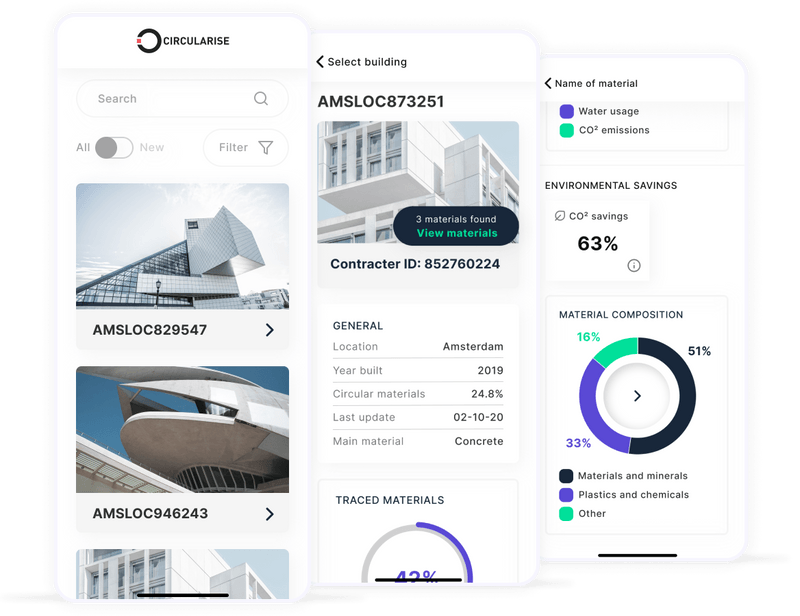
Fig. 1 CIrcularise DPP for construction
2. MADASTER: Unlocking Asset Value Through Material Data
MADASTER provides a platform for managing material data and generating DPPs within the built environment. This platform supports circularity and sustainable building practices by tracking material lifecycles and facilitating informed decision-making. MADASTER's DPP platform offers comprehensive benefits, including precise carbon footprint monitoring, fostering circularity through material tracking, and calculating the residual value of assets. Moreover, it simplifies regulatory compliance by providing detailed data and reporting. By using MADASTER, stakeholders gain deeper insights into their assets, driving sustainable practices and empowering them to achieve a circular and compliant future.
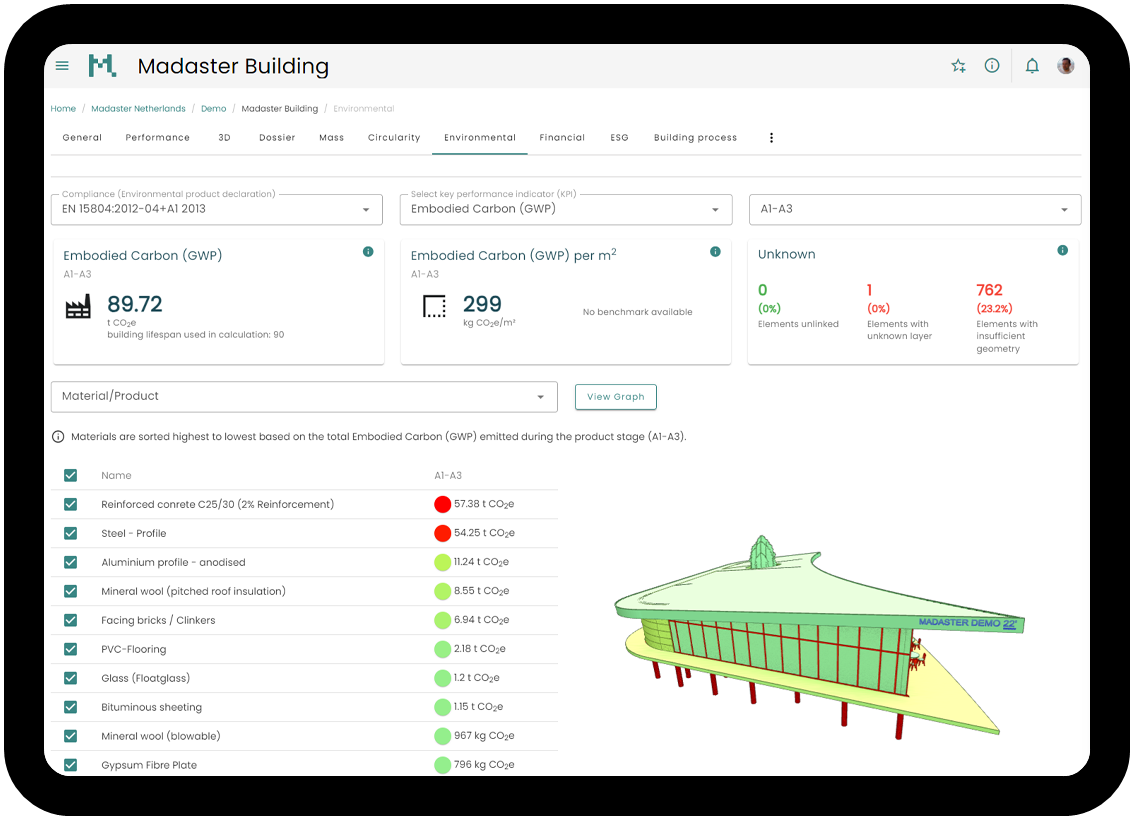
Fig. 2 MADASTER platform
3. PicoNext: AI-Powered DPPs for Construction Materials
PicoNext offers an AI-powered DPP platform specifically designed for construction materials. This platform simplifies sustainability data management and sharing, enabling transparent access to material information for informed decisions and regulatory compliance within the construction sector. PicoNext empowers construction material companies to efficiently generate and manage DPPs by leveraging AI to streamline data processing. This facilitates transparent data sharing, allowing stakeholders to access crucial sustainability information for informed decision-making and regulatory adherence. The platform supports the construction sector in meeting evolving sustainability standards by providing accessible and accurate material data
4. LEVERY approach on DPP
Levery's Digital Product Passport (DPP) revolutionizes construction by offering a transparent, efficient data platform. It enables informed decisions, automates data collection, and creates new business value. Key features include supply chain visualization, impact quantification, and access to technical manuals. The DPP enhances traceability, promotes sustainability, and drives a circular economy by tracking product lifecycles and facilitating material reuse. It empowers stakeholders to make responsible choices, fostering a more efficient and resilient industry.
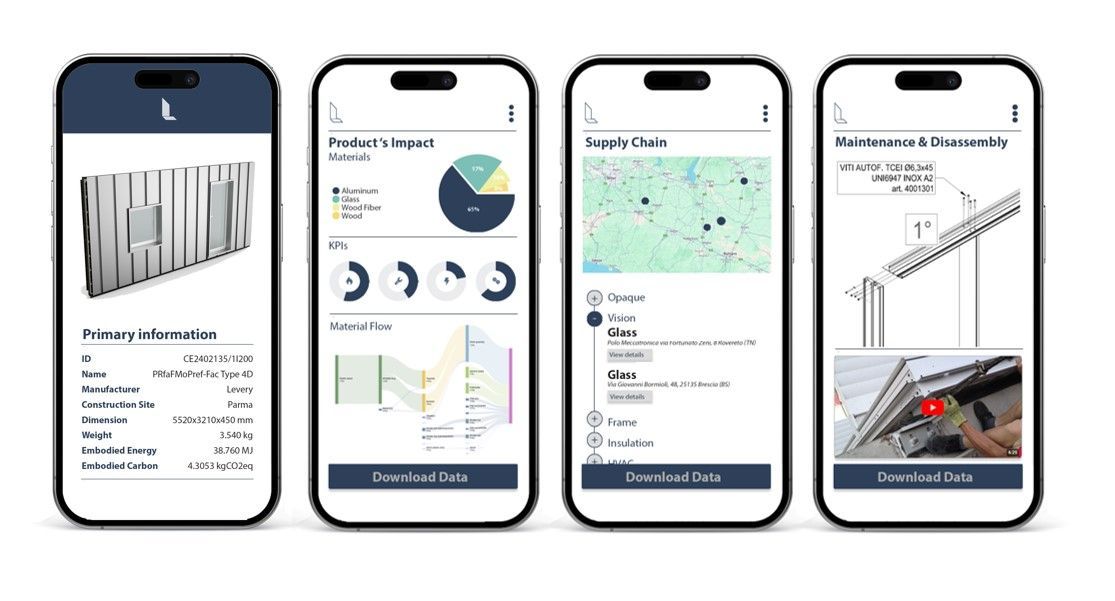
Fig. 3 LEVERY DPP
Key Innovation Elements
These case studies highlight several key innovation elements that are driving the adoption of DPPs in the construction industry:
- Enhanced Transparency: DPPs provide detailed information about the origins, composition, and lifecycle of construction materials, fostering transparency across the supply chain.
- Improved Circularity: By tracking material lifecycles and facilitating data sharing, DPPs enable the implementation of circular economy principles, promoting material reuse and recycling.
- Data-Driven Decision-Making: DPPs provide stakeholders with access to accurate and comprehensive data, enabling informed decisions about material selection, construction processes, and building maintenance.
- Regulatory Compliance: DPPs simplify regulatory compliance by providing detailed data and reporting, ensuring that companies meet evolving sustainability standards.
- AI-Powered Automation: Platforms like PicoNext utilize AI to streamline DPP creation and data processing, making it easier for companies to manage and share sustainability information.
- Residual Value Calculation: Platforms like Madaster, enable to calculate the residual value of building materials, encouraging reuse and extending the lifecycle of materials.
- Environmental Impact Tracking: DPPs enable the tracking of a building’s environmental impact, from material sourcing to lifetime performance, providing valuable insights for sustainable upgrades.
Next Steps and Future Perspectives
The adoption of DPPs in the construction industry is still in its early stages, but the potential benefits are immense. To fully realize the transformative power of DPPs, several key steps need to be taken:
- Standardization: Developing industry-wide standards for DPPs is crucial to ensure interoperability and data consistency.
- Integration: Integrating DPPs with existing building information modeling (BIM) and other digital tools will enhance data sharing and collaboration.
- Education and Awareness: Raising awareness about the benefits of DPPs and providing training to industry professionals is essential for widespread adoption.
- Policy Support: Governments and regulatory bodies should develop policies and incentives to encourage the adoption of DPPs.
- Advanced AI Integration: Further integration of AI will allow for even more efficient DPP creation, data analysis and prediction of materials end of life.
- Blockchain Integration: The integration of blockchain technology can enhance the security and traceability of DPP data, ensuring data integrity and preventing fraud.
As the construction industry continues to evolve, DPPs will play a vital role in driving sustainability and circularity. By embracing these innovative tools, we can build a future where buildings are not only durable and functional but also environmentally responsible. The future of construction is digital, transparent, and sustainable, and DPPs are leading the way.
CALL FOR ACTION
Start your DPP journey today with Levery and transform your construction projects or your building products into energy-generating, future-ready buildings. Let’s work together to create buildings that benefit people, enviroment and economic.
Contact us now to discuss how we can help you integrate solar power into your next project and drive the shift toward a greener future.


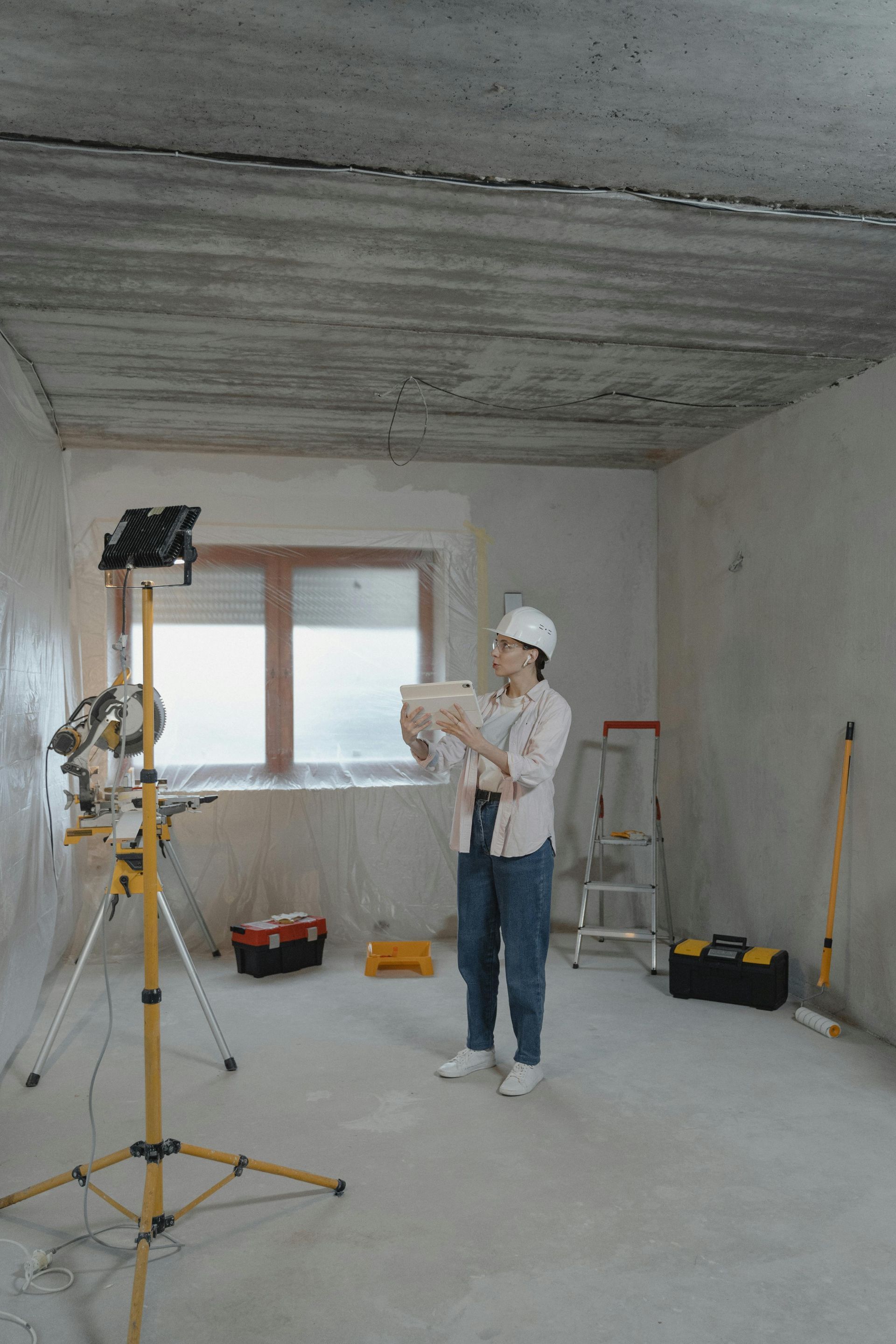
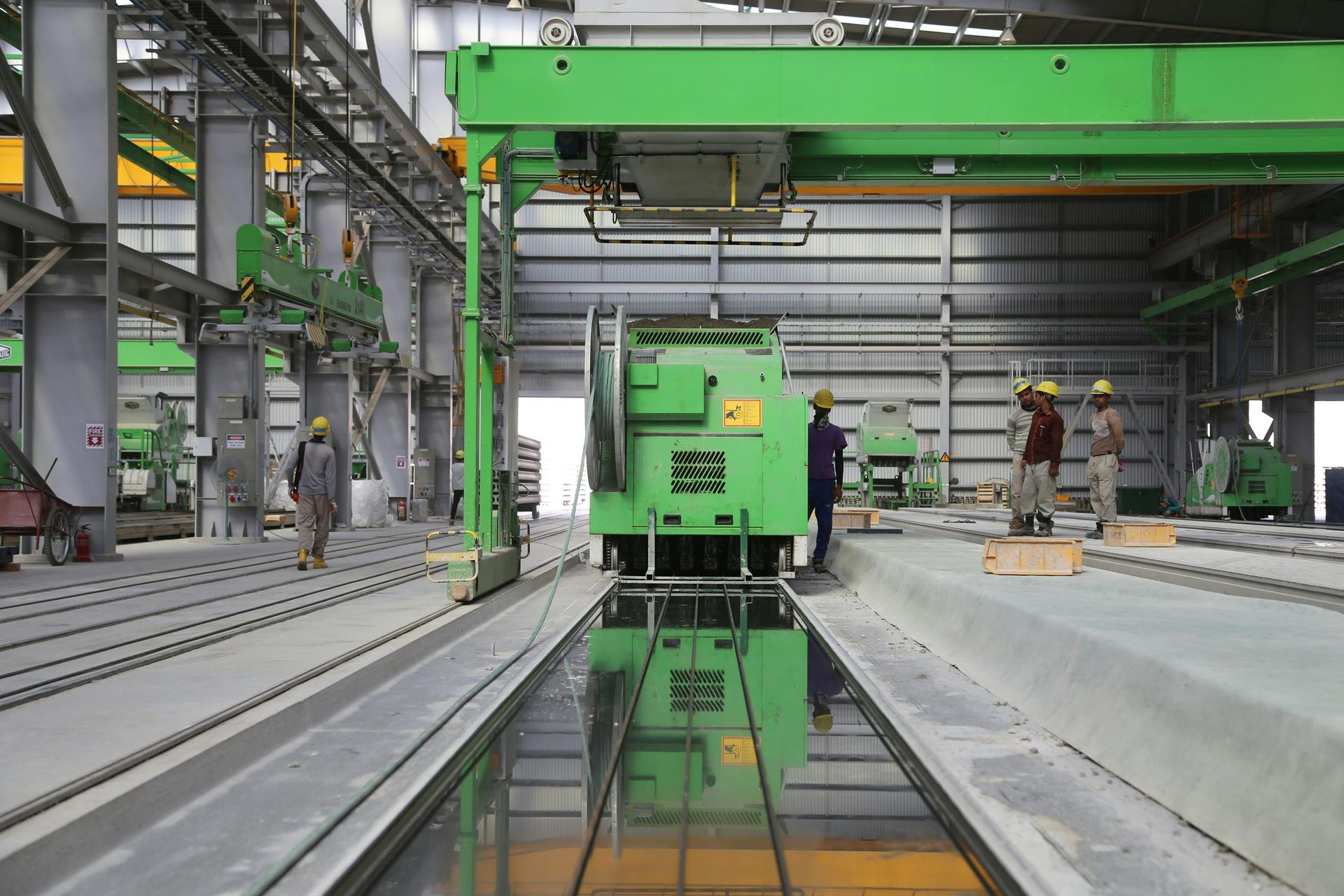

Levery S.r.l. Società Benefit
info@levery.it
Via Pisino 66, 47814
Bellaria Igea Marina (RN), Italy
P.IVA 04730050400
All Rights Reserved | Levery Srl Società Benefit

